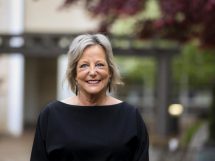
RICHMOND, Ky. (May 29, 2012) — The new executive director of the Innovation and Commercialization Center (ICC) at Eastern Kentucky University is a familiar name and face to many in the central/eastern Kentucky business community.
Kristel Smith, who has held a variety of positions with the EKU Center for Economic Development, Entrepreneurship and Technology (CEDET) since 2003, will work closely with entrepreneurs and business owners to foster job growth in the 14-county ICC service area and other counties in the university’s service area. She succeeds Gary Marshall, who recently retired from the university. Smith also will serve as director of EKU’s Business & Technology Accelerator.
The ICC at Eastern, part of the Kentucky Office for Commercialization and Innovation, works in partnership with the state Cabinet for Economic Development and the Kentucky Science & Technology Corporation to serve 14 counties: Madison, Clark, Estill, Garrard, Boyle, Mercer, Casey, Lincoln, Rockcastle, Jackson, Powell, Lee, Owsley, and Nicholas. Also served are other counties in EKU’s service region: Pulaski, Laurel, Wayne, McCreary, Whitley, Knox, Clay, Leslie, Perry, Harlan and Bell.
While with CEDET, Smith has served as director of entrepreneur services for the Innovation and Commercialization Center Network, director of the Berea Entrepreneur Assistance Center and interim director of CEDET. She played a leading role with EKU in the establishment of innovation centers in Ashland, Morehead, Paintsville and Pikeville.
“Kristel has a deep and extensive knowledge of the process involved with starting and growing companies in Kentucky,” said CEDET Executive Director Ian Mooers. “Kristel’s expertise in business development is garnered from her work in the private sector and, specifically, her work with Procter & Gamble, where she led day-to-day management of business and product lines. Kristel’s established network of individuals and resources will serve both the program and the clients well in to the future. I am looking forward to where she will take the program as we go in to the future.”
Over the past nine years, Smith said she has “learned, and we have established, that this region does have potential in entrepreneurship and economic development. We have proven that there is an opportunity for job creation in rural America. It’s easier than ever to work from anywhere and have customers globally.
“And I’ve learned that communities that are associated with or linked to universities tend to be more economically strong than those that aren’t,” she added. “The technical assistance we’re able to provide helps businesses and communities to be more sustainable.”
Smith said the ICC is looking for entrepreneurs and growth-minded companies that are developing a technology, product or service that fits into one of its five focus areas: agriculture and bioscience, human health and personalized medicine, materials science and advanced manufacturing, information technology and new media, and environmental and energy technologies.
The ICC provides one-on-one consulting, mentoring, advising and coaching and hosts many training sessions and seminars.
“Most of all,” Smith said, “we connect clients to various resources to help them grow their business, including lending and equity investment opportunities, and grants.”
The Kentucky Science and Technology Corporation offers three such opportunities:
• Kentucky Enterprise Fund, which provides capital to early-stage technology companies in Kentucky. Companies may apply for a $30,000 grant, an initial investment of up to $250,000, or follow-on funding up to $750,000.
• Rural Innovation Fund, which provides capital to early-stage technology companies in rural Kentucky. Companies may apply for a $30,000 grant or an investment up to $100,000.
• Kentucky New Energy Ventures, a fund that provides capital for companies exploring alternative and renewable energy technologies. Companies may apply for a $30,000 grant, an initial investment up to $250,000, or follow-on funding up to $750,000.
Because the ICC, the Small Business Development Center and CEDET are physically housed in EKU’s Business and Technology Center on the Richmond campus, other CEDET staff, as well as faculty members and graduate students, constitute a convenient and valuable resource to both the ICC and incubator clients. EKU School of Business alumni are also serving as mentors.
In addition to the ICC clients in the region, seven clients are now utilizing the business and technology accelerator, more commonly known as an incubator.
Smith earned a bachelor’s degree from Southern University and a master’s of business administration degree from the University of Kentucky. She has more than 20 years of experience in the business field.
For more information about the ICC or the accelerator, visit www.easternicc.eku.edu or contact Smith at [email protected] or at 1-859-622-8571.



















Add Comment